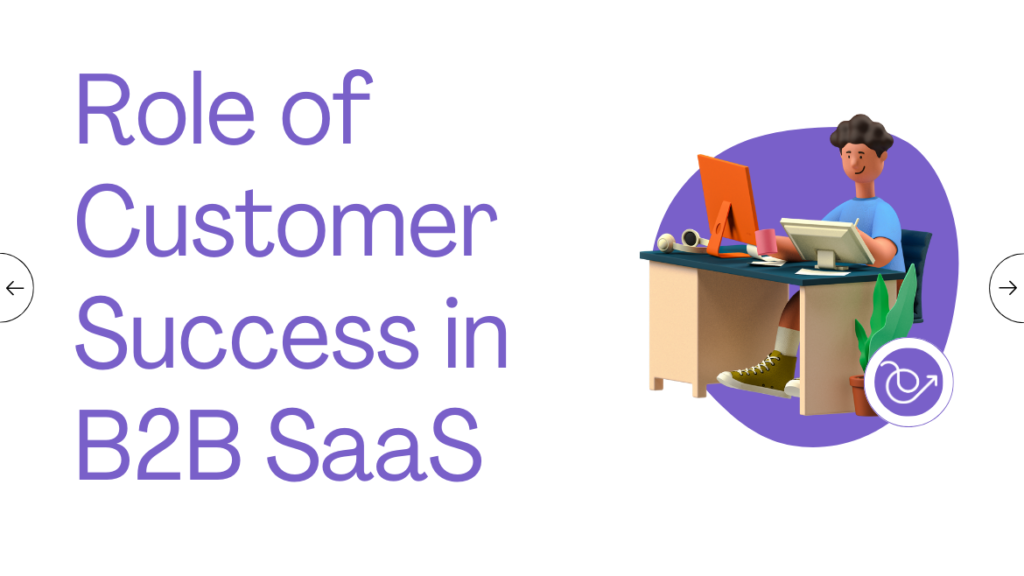Over the past decade, customer success has grown beyond a strategy for B2B SaaS brands to ensure customer stickiness. In fact, it is not limited to a strategy anymore, and has become an approach to conduct their business for the betterment of their audience in the long run.
It is the proactive approach of helping customers achieve their desired outcomes when using your product.
According to a report, the global SaaS market was valued at $166 billion in 2021 and is expected to reach $307 billion by 2026.
But, is that all there is to customer success? Of course not.
Let’s understand the role it plays in a B2B SaaS brand’s journey in this blog.
Understanding Customer Success in B2B SaaS
B2B SaaS companies are committed to customer success because it involves proactively ensuring customer satisfaction and maximizing their product’s value to them. As a result, we anticipate customer challenges and provide solutions before they occur.
It is essential to differentiate customer success from customer support and account management. While customer support is reactive and focuses on addressing specific technical issues, account management is more relationship-oriented. On the other hand, customer success is proactive and aims to help customers achieve their organizational goals by increasing product utilization.
Boosting customer success should be a top priority for B2B SaaS companies, as it directly impacts customer retention and, ultimately, the bottom line.
In fact, a study by Gainsight found that companies with dedicated customer success teams experienced a 26% increase in customer retention rates.
Importance of Customer Success in B2B SaaS
Customer success is a key part of B2B SaaS for both providers and customers. It’s more than just post-sale support, it’s about helping customers succeed.
It plays an important role in enhancing customer satisfaction, retention, and long-term success for B2B SaaS companies.
1. Onboarding Process for New Customers
The onboarding process is the first step in a customer’s journey with your company. The initial interaction sets the tone for the entire customer experience. A smooth and personalized onboarding process is crucial in building a solid foundation for a long-term relationship with your customer.
This process should include a comprehensive welcome package, clear communication of expectations, and personalized training to ensure the customer is set up for success.
2. Maintaining Relationship with Existing Customers
While onboarding focuses on getting new customers up and running, team focuses on maintaining and growing that relationship. This involves setting goals and objectives for the customer and working collaboratively to achieve them.
It also includes creating a roadmap for the customer’s journey with your product and ensuring they continuously find value in it. This is an ongoing process involving regular communication and progress monitoring.
3. Conducting Quarterly Business Reviews
Quarterly business reviews (QBRs) are crucial for a customer’s success in B2B SaaS. These reviews provide an opportunity to discuss the customer’s progress, identify any roadblocks, and strategize for the future.
QBRs should involve key stakeholders from both the customer’s and your company’s teams to ensure alignment and collaboration. They also serve as a platform for collecting valuable feedback and identifying areas for improvement.
4. Utilizing Playbooks for Consistent Customer Success Strategies
Playbooks are an essential tool for maintaining consistency in customer success strategies. They outline the steps to be taken at each stage of the customer’s journey and guide for handling common customer issues.
Playbooks also ensure that all team members are following a standardized approach to customer success, leading to a more efficient and cohesive team.
5. Providing Self-Service Content for Customer Education
Investing in self-service content is a valuable strategy for customer success in B2B SaaS. This can include resources such as knowledge bases, tutorials, and webinars.
By providing customers with the tools to educate themselves, you empower them to find answers to their questions and become more self-sufficient. This improves their overall experience and reduces the burden on your team.
6. Importance of Feedback Loops for Continuous Improvement
Customer feedback is a valuable source of insight for improving your product and processes. Customer success teams should establish feedback loops to collect and analyze customer feedback regularly. This can be done through surveys, support tickets, or one-on-one conversations.
Implementing changes based on customer feedback and eventually net promoter score shows that their opinions are valued and can lead to improvements that ultimately drive customer satisfaction and retention.
Customer Success in B2B SaaS: Ready for Renewals and Growth?
To create a customer-centric culture in your organization, it is essential to prioritize customer success early on.
As SaaS expert Jason Lemkin suggested, hiring a dedicated customer success manager should be one of the first ten hires for your business.
However, customer centricity should not be limited to the customer success team; it should be ingrained in the mindset of the entire company.
According to research, companies with a dedicated customer success team have a 5% higher customer retention rate, which can lead to a revenue increase of 25-95%.
Once you understand the importance of customer success for your B2B SaaS brand, contact us and we can help you build a team that is effective and results-oriented.

3 thoughts on “The Importance of Customer Success in a B2B SaaS Business”
Comments are closed.